Phil Thompson was bestowed with an honour that only he can lay claim to and it came thanks to years of dedication to a club that has long been in his heart.
Somewhere in the early months of 1970, a young Phil Thompson is walking away from Melwood, the soon-to-be iconic training base of Liverpool Football Club.
Alongside him is his mother, June, the woman who had introduced him to the team that would eventually consume the rest of his life. They’re on their way into town to meet his aunty, but the youngster only has one thing on his mind – will the club he loves offer him an apprenticeship?
June and her twin sister, May, have been following the Reds from their seats in the Paddock, just behind the dugout, since the 1950s. It had been his mother’s influence, not his father’s, that guided her son to his second trial for Bill Shankly‘s Liverpool. Owen Thompson, Phil’s father, was a merchant seaman and often worked away. He was also an Evertonian.
The dream starts here
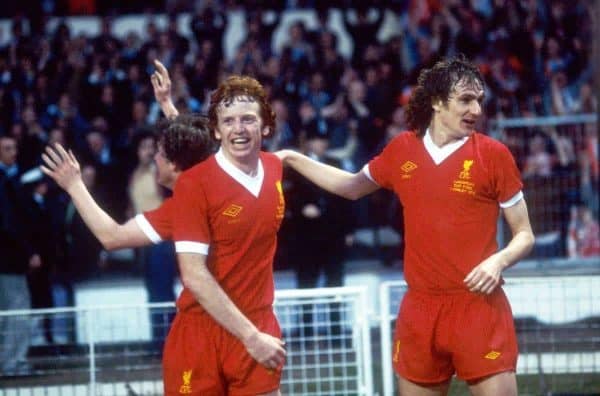
For Phil, football had been the dominant force in his life for as long as he could remember and he was rarely seen without a football in his hand. Born in the Kensington area of the city on January 21, 1954, Thompson was one of seven children. Despite his father’s allegiances, he had developed a passion for Liverpool FC and had already graduated from the Boys’ Pen and was a regular on the Kop.
In his autobiography, Stand Up Pinnochio, he recalls climbing up a drainpipe to get into the ground and getting chased by stewards. It had been a right of passage shared by many kids in Liverpool, but soon he would step down from the steps of that famous old terrace and take his place on the pitch alongside many of the men he had worshipped as a fan.
In the early ’60s, the Liverpool Corporation began a huge housing improvement scheme, and Phil’s family along with many more moved out of Kensington to places like Kirkby. For the young Thompson, Kirkby had two things going for it. The first was the River Alt (it may have been just four feet wide and probably just as deep) but as far as he and the family were concerned they had moved to the ‘seaside’. The other selling point was the fact that the new family home backed onto a playing field.
He would spend every available hour on it, kicking a football, or playing games of S.P.O.T. against the front wall of his family home. The game was a simple one, you hit the ball against a designated spot, and if you missed you were given the first letter of that word. You were out once you had received all four letters. These thousands of practice hours no doubt helped him on the road to a professional career, which would actually start with an invite to train with Everton, an offer he accepted even though he would later say it felt like “a betrayal.”
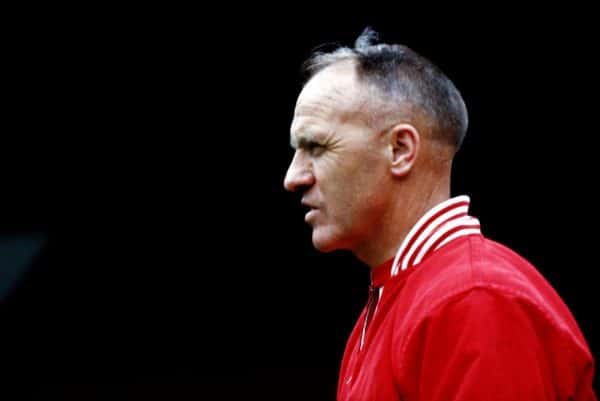
It would be while playing for St Joseph’s, a local Sunday League side, that Thompson was brought to the attention of Shankly’s Liverpool. The team’s manager, Jimmy Gamble, was a steward at Anfield and he had invited one of the club’s scouts to come and watch Phil in a game, an invite to train with the club on Tuesdays and Thursdays would soon follow.
At Anfield, Phil was under the tutelage of the likes of Reuben Bennett, legendary club stalwart George Patterson and Tom Bush. His first trial would end in heartbreak when the club didn’t take him on. However, there would be a glimmer of hope and an invite to return for a second trial in pre-season.
He felt the trial had gone well but had been given no indication from Bush that he would be signing papers. With his father away at sea, Phil turned to his mother and pleaded with her to find out if his dream would finally be realised or not.
As they strolled along Melwood Drive toward the bus stop on Mill Road, past a patch of land that would later be named the ‘Bill Shankly Playing Fields’, Thompson’s mother could resist her son’s pleas no more. She turned to him and swore him to secrecy. Bush had told her that an offer of an apprenticeship would be made the following day. The youngster could hardly believe it and immediately began dancing and shouting with excitement.
He would throw himself into life at Anfield, giving everything in training, while off the field he would polish the professionals’ boots and clean up around the ground. This was a dream come true and he wasn’t going to let it slip from his grasp without a fight.
Thommo and Shankly
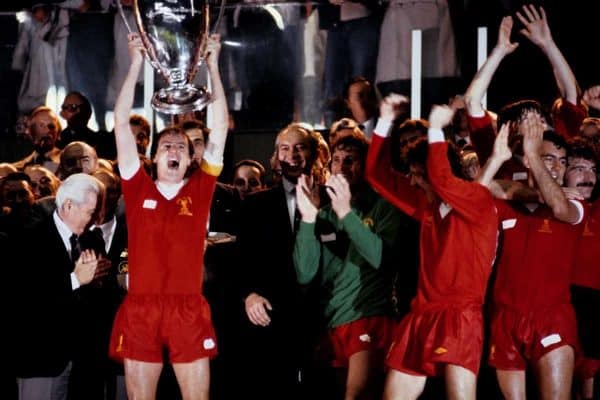
Soon he would be approaching his 17th birthday, a tense time for apprentices. Nerves would start to kick in and sleepless nights would follow. Was the club about to crush his dream by cutting him loose, or was his life about to change forever with the offer of a professional contract? The answer came one afternoon at Melwood when none other than Shankly himself approached him.
The great man would enquire if the youngster had been sleeping and eating well, then simply announced that the club were pleased with his efforts, and he’d be offering Phil a professional contract on his 17th birthday. He would earn £7 a week.
For such a momentous moment to arrive in such a matter-of-fact manner must have felt surreal, but he had, at last, made the step he had always dreamed of. Thompson has often spoken of his deep admiration for Shankly. The man was like a God to him. So much so that he cherished every conversation with the Scot, even the ones where he was the butt of the joke.
Shankly once remarked upon eyeing the youngster’s rather large nose, “Christ son, you must have told a lot of lies as a kid.” In another barb, the legendary manager would quip that Thompson “had a toss-up with a sparrow for a pair of legs and lost.” The latter was a reference to Phil’s gangly frame and the youngster was more than happy to be attracting any kind of attention from the boss, even if it was at his expense.
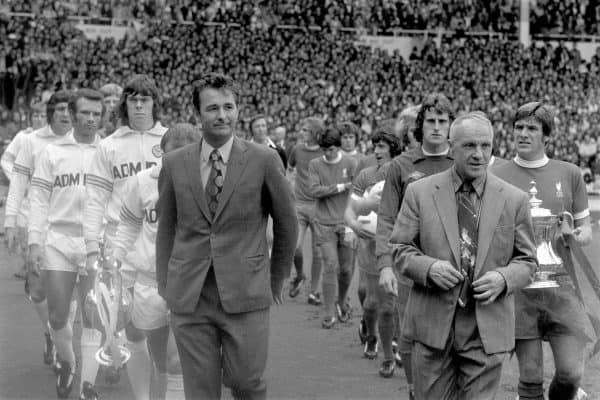
Thompson would be in the travelling party, on the road to Wembley, as the Reds got set to take on Arsenal in the 1971 FA Cup final. He would watch from the balcony of the old stadium and sobbed his heart out when his beloved Reds lost the game. This was a Kopite playing for the team he adored, and he would suffer that defeat alongside his fellow supporters.
Thompson made his professional debut in a 3-0 win over Man United at Old Trafford in January 1972, almost three weeks before his 18th birthday. With the game heading into the last 10 minutes, and the Reds 2-0 up thanks to second-half goals from Chris Lawler and John Toshack, Shankly decided to take off his Welsh hitman and give a run out to his Scouse protege.
Within three minutes, Emlyn Hughes had made it 3-0. Making your professional debut in a 3-0 win away to United can’t be bad, but for Phil, this was only the beginning.
Thompson never lacked confidence, he was a perfectionist and would be furious with himself if things didn’t go his way.
He would famously walk into Shankly’s office after the manager had dropped him from a game, and asked him, “Why didn’t you pick me, boss?” The manager looked him up and down, no doubt admiring the youngster’s pluck, and said:
“Son, you will play many games for this club, for many years to come. One day you will captain this club. I wouldn’t even be surprised if you captained your country. You should thank me for dropping you on Saturday.”
From pitch to backroom
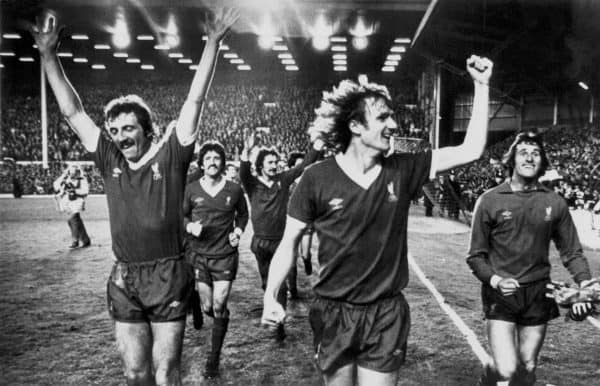
Shankly’s words would prove prophetic. Phil Thompson would indeed captain the club. He would go on to play 477 times for Liverpool, scoring 13 times and collecting seven league titles, two FA Cups, two League Cups, two European Cups and two UEFA Cups. He would also serve the club in assistant and caretaker manager roles.
Thommo would be a key backroom figure in the all-conquering Kenny Dalglish sides of the 1980s and would be controversially sacked by Souness in 1992. He was also one of the architects of the 2001 treble season as Gerard Houllier’s assistant. It was, of course, Thompson who led the team for six months during Frenchman’s illness the following season, helping the Reds to a second-place finish in the process.
Above all he knew exactly what it meant to represent the Kop, he once referred to the terrace as his “pride and joy,” and he never allowed himself to give anything less than his all, in a Reds shirt or as part of the backroom staff. That meant he couldn’t tolerate second-best from any player in a red shirt.
It would make him a tough and sometimes unforgiving coach, a fact that once put him at loggerheads with a young Robbie Fowler. A conflict that resulted in a training ground bust-up, and a very public stand-off between the two.
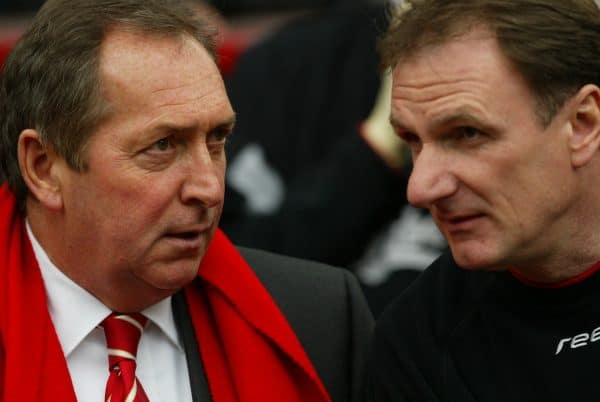
Fowler would go on to say that a lot of young players despised Thompson for his hard-line attitude to coaching. He would often handle dissent by demanding that the young upstart put their medals on the table, stating “let’s see who knows best.”
Nobody could question Thompson’s career though. After all, none other than Bob Paisley would have this to say of him:
“I regard Phil as one of the best possible examples of a true professional. His greatest asset as a player is his ability to read the game, he showed that gift even as a teenager.
“He is not the biggest man physically for his role in defence but his football brain is outstanding.”
A first with ‘Ol Big Ears
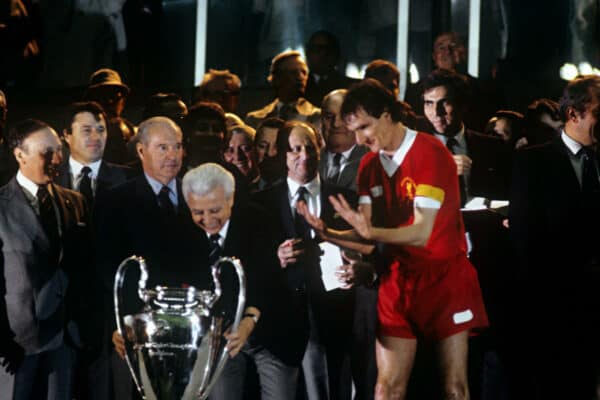
After making his debut in 1972, Thompson would become a league champion and UEFA Cup winner, before being handed the task of handling Newcastle‘s Malcolm Macdonald in the 1974 FA Cup Final.
‘Super Mac’, as he was called in the North East, and by Fleet Street, had famously boasted about how he would destroy Liverpool at Wembley in the run-up to the game. Hindsight would prove his words to be foolhardy, but when he must have rubbed his hands with glee upon realising that he was up against a spindly 20-year-old in the Reds’ defence.
Thompson finished the game with the Newcastle man in his back pocket and would turn in a display of defensive solidity and composure that earned him many plaudits. His performance would be the cornerstone of Liverpool’s 3-0 demolition of the Geordies and helped to secure the club’s second FA Cup.
Phil’s list of magical moments is almost as long as his trophy haul. He maintains that becoming a Liverpool player is his greatest achievement and, after that, captaining the club. That honour would eventually be bestowed upon him in the 1978/79 season.
That year Emlyn Hughes’ powers were beginning to wane, and he was struggling to hold down a regular starting place. At one point Dalglish would be handed the captaincy in the absence of Hughes, who had succumbed to injury. It was an idea that caused consternation amongst players like Terry McDermott and Phil Neal.
According to his autobiography, Thompson admits he couldn’t understand it and began to doubt himself. It was common for the captain to be a defender, and with Thompson a local lad who had been an almost ever-present, he felt this should have been his time.
Eventually, though, he would get to wear the armband with pride as he had always dreamed. With Liverpool preparing to face Arsenal in a home game in April 1979, Paisley would ask him to lead the team out. He never looked back. With the Reds pursuing the title, this was a great honour and Phil wouldn’t let the team down in the end-of-season run-in.
Reds of a certain vintage will remember how Thompson would drink champagne on the Anfield pitch after Liverpool had secured their 11th league championship, following a 3-0 victory over Aston Villa in 1979. It would be his fourth league winner’s medal since breaking into the team just seven years earlier. He would tell the Liverpool ECHO, on the night:
“For me, a boy from the Kop, to lead Liverpool out, on the night they won the title, at Anfield, was a fabulous feeling.”
Things were destined to get even better though for the lad from the Kop. Under his captaincy, the team would retain the league title in 1980. Then, in 1981, Thompson would do the footballing equivalent of ascending the steps to heaven.
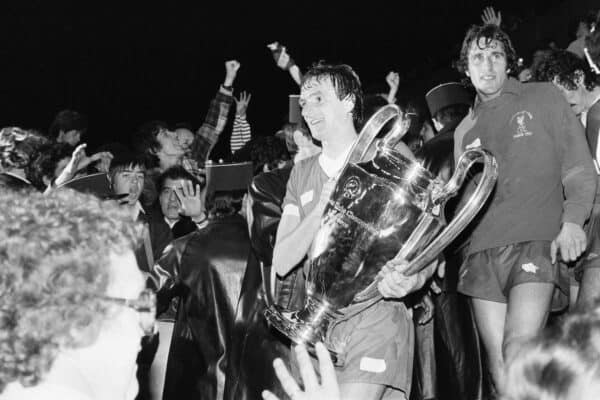
Though his beloved Liverpool had finished a distant fifth in the league and been dumped out of the FA Cup in the fourth round, he had led them to a League Cup win with victory over West Ham. But the best was yet to come.
Liverpool had reached their third European Cup Final in four seasons. The stage would be Paris and the opponents were the mighty Real Madrid. Thompson now had the chance to become the first Scouser to lift the biggest trophy in European football.
In truth, it wasn’t the greatest game in the history of the competition. The Reds laboured to a 1-0 win thanks to an iconic goal from left-back Alan Kennedy. That didn’t matter to Tommo though, as he proudly hoisted ‘old big ears’ aloft in the Parc des Princes on May 27 1981, as captain of the team he grew up supporting.
Others would follow; Dennis Mortimer, a boy from Liverpool, would lift it in 1982 for Aston Villa. In 2005, Huyton-born Steven Gerrard joined the exclusive club by captaining Liverpool to their fifth European Cup in Istanbul.
However, the honour of being the first Scouser to lift the biggest prize as captain will always belong to Kirkby’s Phil Thompson.
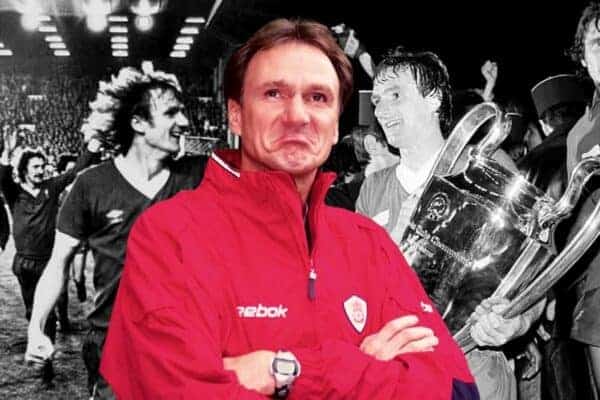


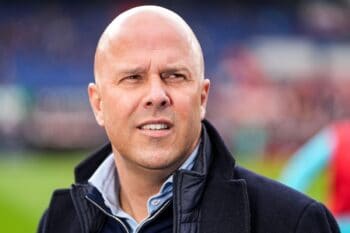


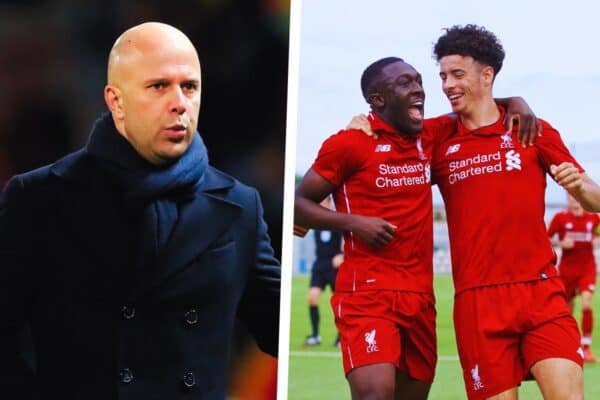
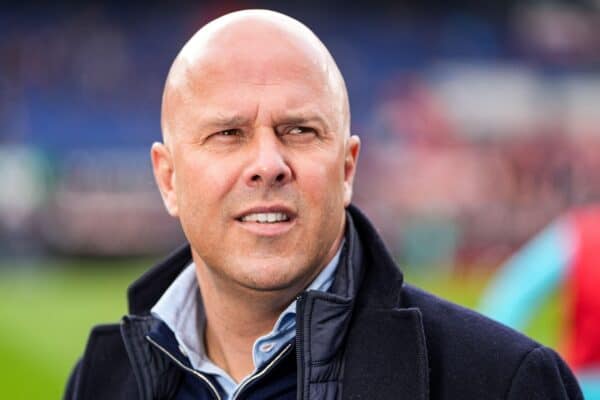
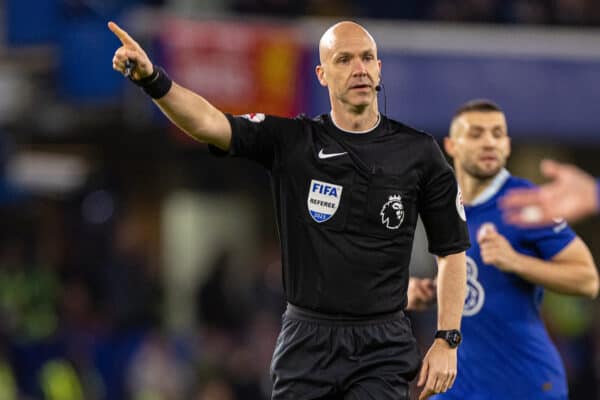
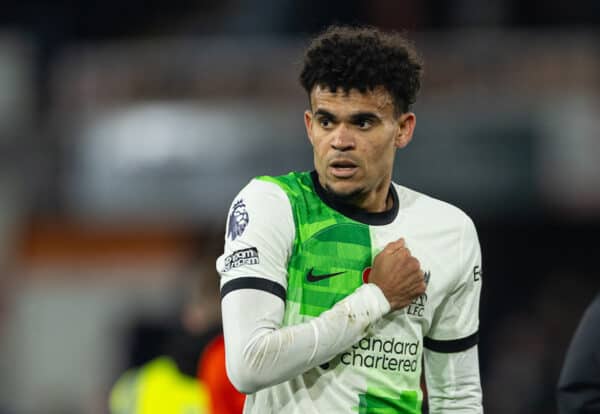
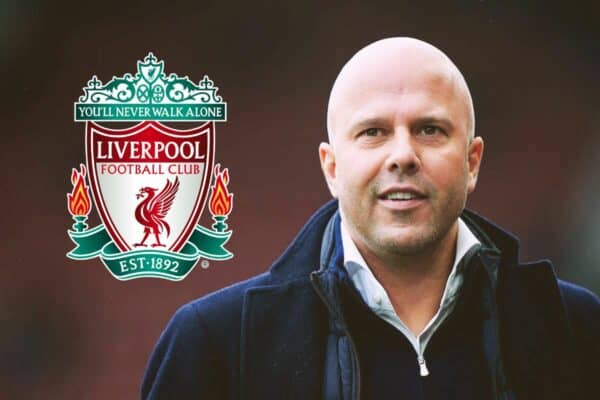
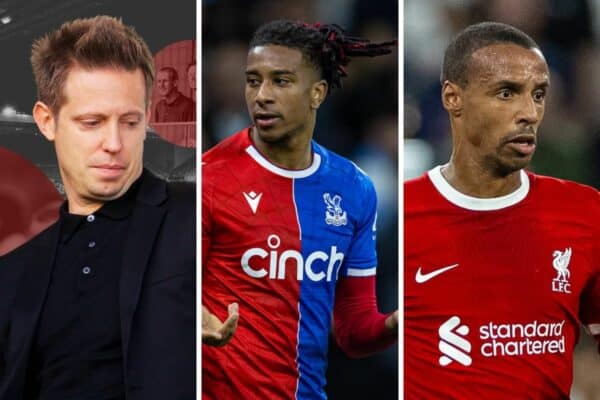
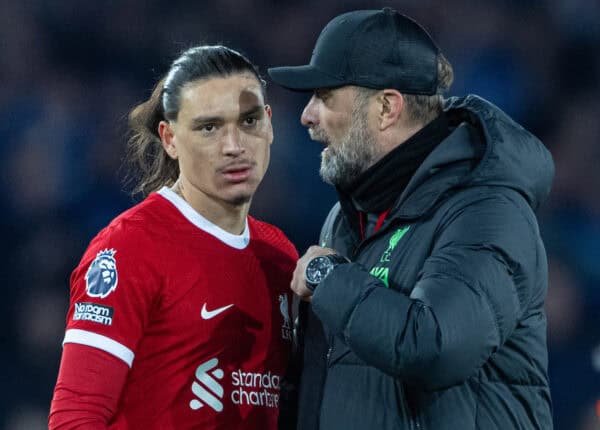
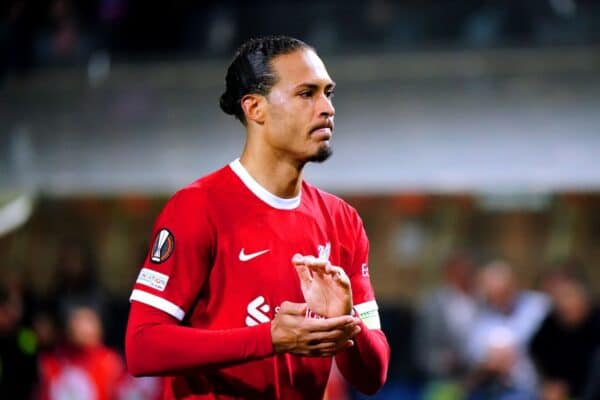
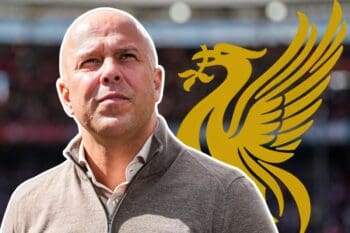

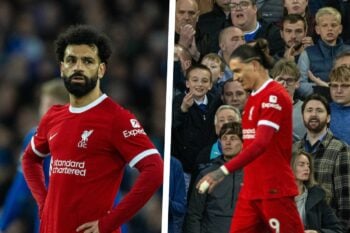
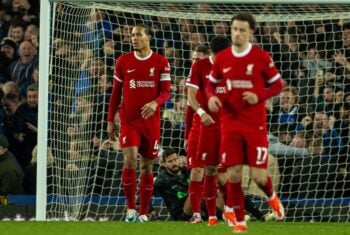

Fan Comments